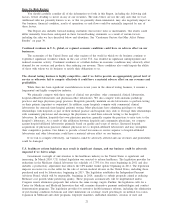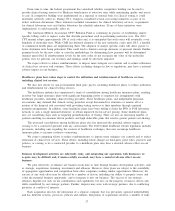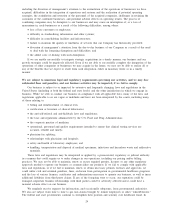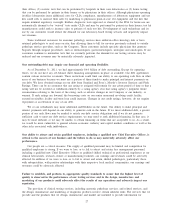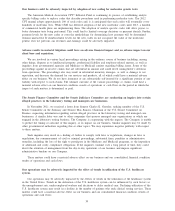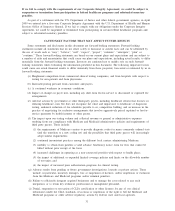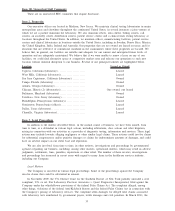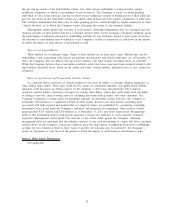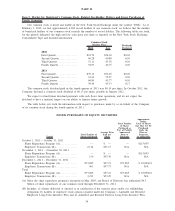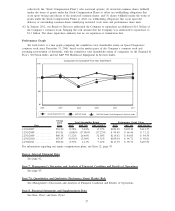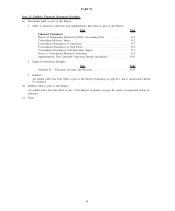Quest Diagnostics 2011 Annual Report Download - page 36
Download and view the complete annual report
Please find page 36 of the 2011 Quest Diagnostics annual report below. You can navigate through the pages in the report by either clicking on the pages listed below, or by using the keyword search tool below to find specific information within the annual report.Our business could be adversely impacted by adoption of new coding for molecular genetic tests.
The American Medical Association CPT威Editorial Panel is continuing its process of establishing analyte
specific billing codes to replace codes that describe procedures used in performing molecular tests. The 2012
CPT manual adopts approximately 100 of such codes and, it is anticipated that such codes will eventually cover
hundreds of molecular tests. While CMS has deferred adoption of the new molecular codes until 2013, a handful
of commercial health plans are implementing them. The adoption of analyte specific codes will allow payors to
better determine tests being performed. This could lead to limited coverage decisions or payment denials. Further,
payment levels for the new codes or even the methodology for determining how payment will be determined
remains unresolved. If reimbursement levels for the new codes do not recognize the value of the molecular
genetic tests we perform, our revenues and earnings could be adversely impacted.
Adverse results in material litigation could have an adverse financial impact and an adverse impact on our
client base and reputation.
We are involved in various legal proceedings arising in the ordinary course of business including, among
other things, disputes as to intellectual property, professional liability and employee-related matters, as well as
inquiries from governmental agencies and Medicare or Medicaid carriers regarding billing issues. Some of the
proceedings against us involve claims that are substantial in amount and could divert management’s attention
from operations. The proceedings also may result in substantial monetary damages, as well as damage to our
reputation, and decrease the demand for our services and products, all of which could have a material adverse
effect on our business. We do not have insurance or are substantially self-insured for a significant portion of any
liability with respect to such claims. The ultimate outcome of the various proceedings or claims could have a
material adverse effect on our financial condition, results of operations or cash flows in the period in which the
impact of such matters is determined or paid.
The Senate Finance Committee and the Senate Judiciary Committee are conducting an inquiry into certain
alleged practices in the laboratory testing and managed care businesses.
In November 2011, we received a letter from Senator Charles E. Grassley, ranking member of the U.S.
Senate Committee on the Judiciary and Senator Max Baucus, Chairman of the U.S. Senate Committee on
Finance, requesting information regarding certain alleged practices in the laboratory testing and managed care
businesses. A similar letter was sent to other companies that sponsor managed care organizations or which are
engaged in the laboratory testing business. The Company is cooperating with the request. The Company is unable
to predict the timing or outcome of this inquiry, or its impact on our business. Similar inquiries may be made by
other governmental authorities regarding this or other topics. We may experience negative publicity with respect
to these matters.
Such inquiries may result in a finding of failure to comply with laws or regulations, changes in laws or
regulations, the commencement of civil or criminal proceedings, substantial fines, penalties or administrative
remedies, including the loss of the right to participate in the Medicare and Medicaid programs, or the imposition
of additional and costly compliance obligations. If the inquiries continue over a long period of time, they could
divert the attention of management from the day-to-day operations of our business and impose significant
administrative burdens on our Company.
These matters could have a material adverse effect on our business and our consolidated financial condition,
results of operations and cash flows.
Our operations may be adversely impacted by the effect of trends in utilization of the U.S. healthcare
system.
Our operations may be adversely impacted by the effects of trends in the utilization of the healthcare system
in the United States. Trends in the utilization of the U.S. healthcare system can be influenced by such factors as
the unemployment rate, under-employed workers and decisions to delay medical care. Declining utilization of the
U.S. healthcare system may result in a decline in the number of patients who seek clinical testing services. These
matters could have a material adverse effect on our business and our consolidated financial condition, results of
operations and cash flows.
30



